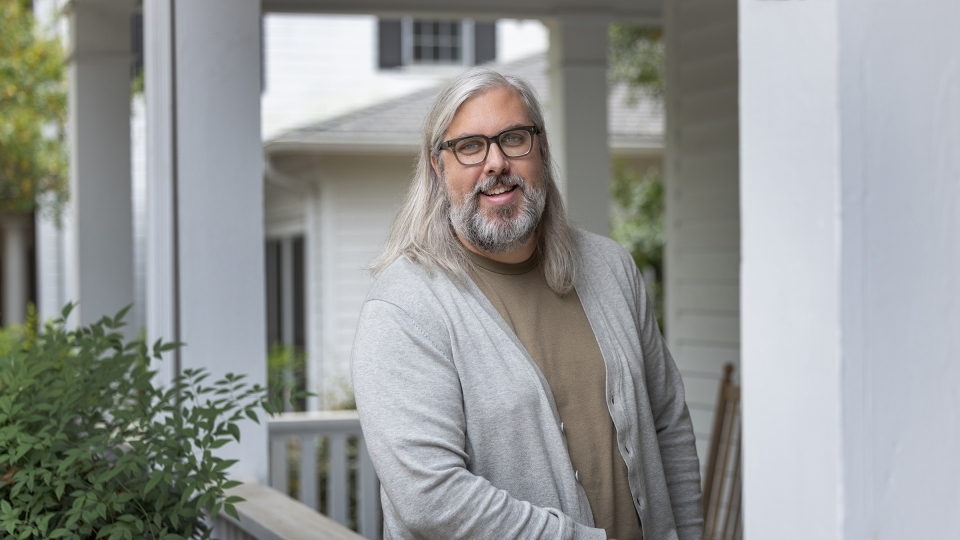Punk Rock Ph.D.: Jeremy Hunt ’03 Brings Creativity to Personal Pursuits and Projects for Alma Mater
November 5, 2024
- Author
- Caroline Roy '20

As the Davidson College social media manager since 2021, Jeremy Hunt ’03 draws on decades of personal experience engaging online with fellow musicians, artists and friends across the world.
An experimental musician, record label creator, theologian, noise rock fan and father to five daughters, he’s always looking for the places work, life and art intersect.
Hunt, who received the William Dallas Herring and Louise Murphy Williams Scholarships, made his own music for the first time in his electronic music course at Davidson. With access to basic recording and editing tools, he became interested in the ambient sounds around him. His final project sampled the noise of nearby groundwork, chopping it up to create a melody.
After graduating, Hunt worked as a College Communications Fellow for a year before leaving to work for Young Life and later for a nonprofit in Charlotte. It would be several years before he again found time for music.
“I realized if I could let go of my preconceived notions about who could be an artist, I could start making things for myself,” he said. “Now, music is a life-giving habit for me. I needed to make space for the loud, chaotic things I wanted to create outside of work.”
Hunt began connecting with other musicians through platforms like X (formerly Twitter), Instagram and Facebook. He is an avid fan of the hardcore and punk scenes, and social media gave him a way to discover underground artists, collaborate with friends across the country and support the music community.
Rock Bands, Record Labels and Davidson Music
In 2014, Hunt moved to California to attend Fuller Theological Seminary and reached out to his friend Mike Strickler, who had experience producing music. Collaborating over several months, the duo created an album as part of Hunt’s master’s thesis. With the addition of Hunt’s cousin, Caiden Withey, they formed QOHELETH, a noise rock band named for the narrator of the Book of Ecclesiastes.
When he returned to North Carolina, Hunt and Strickler, who now lives in Salt Lake City, Utah, continued working on demos and exchanging music. Despite the distance, QOHELETH has created four albums and four EPs, available on audio distribution sites like Bandcamp.
“With everyone so spread out, we can’t play live shows,” Hunt said. “We’ve had to get creative, enhancing the listening experience through art, zines and merchandise. After so many years of long distance collaboration, I’m ready to think about how to better plug into Charlotte’s music scene.”
In 2018, Hunt launched his small, independent record label Philip K. Discs, which helps elevate DIY musicians across the world.
“It can be hard to make a living as a musician,” he said. “I’m lucky to be able to make the kind of music I want, and now I’m interested in serving what other people are doing. Just like with my social media work, I’m not the story — I’m just highlighting the stories of others.”
He recently returned to his electronic composition roots, this time through a creative project for the college. Partnering with Assistant Director for Multimedia Production Alex Smith, Hunt set out to create a Lo-Fi study mix of original music, a soothing backdrop for Davidson students during their busy semesters. At the heart of the project, once again, are sounds sampled from across campus — birdsong, rustling leaves, the bells of Davidson College Presbyterian Church, campus chatter and the trickle of fountain water from the courtyard of the E. Craig Wall Jr. Academic Center.
“This is the first time this kind of thing has ever overlapped with my job,” Hunt said. “I love improvising and gathering the natural sounds around us. Lo-Fi mixes like this one are all over the internet, and I wondered what it would look like to have one tailored to this community.”
Hunt recently completed his first book, a scholarly work called From Chaos to Ambiguity: a Theology of Noise Rock, which concludes his Ph.D. in theology and culture.
“I’m deeply passionate about getting more people to create art, even just for themselves or for a small audience,” he said. “There’s value in the process of creation. It’s a way to showcase our humanity to one another.”



